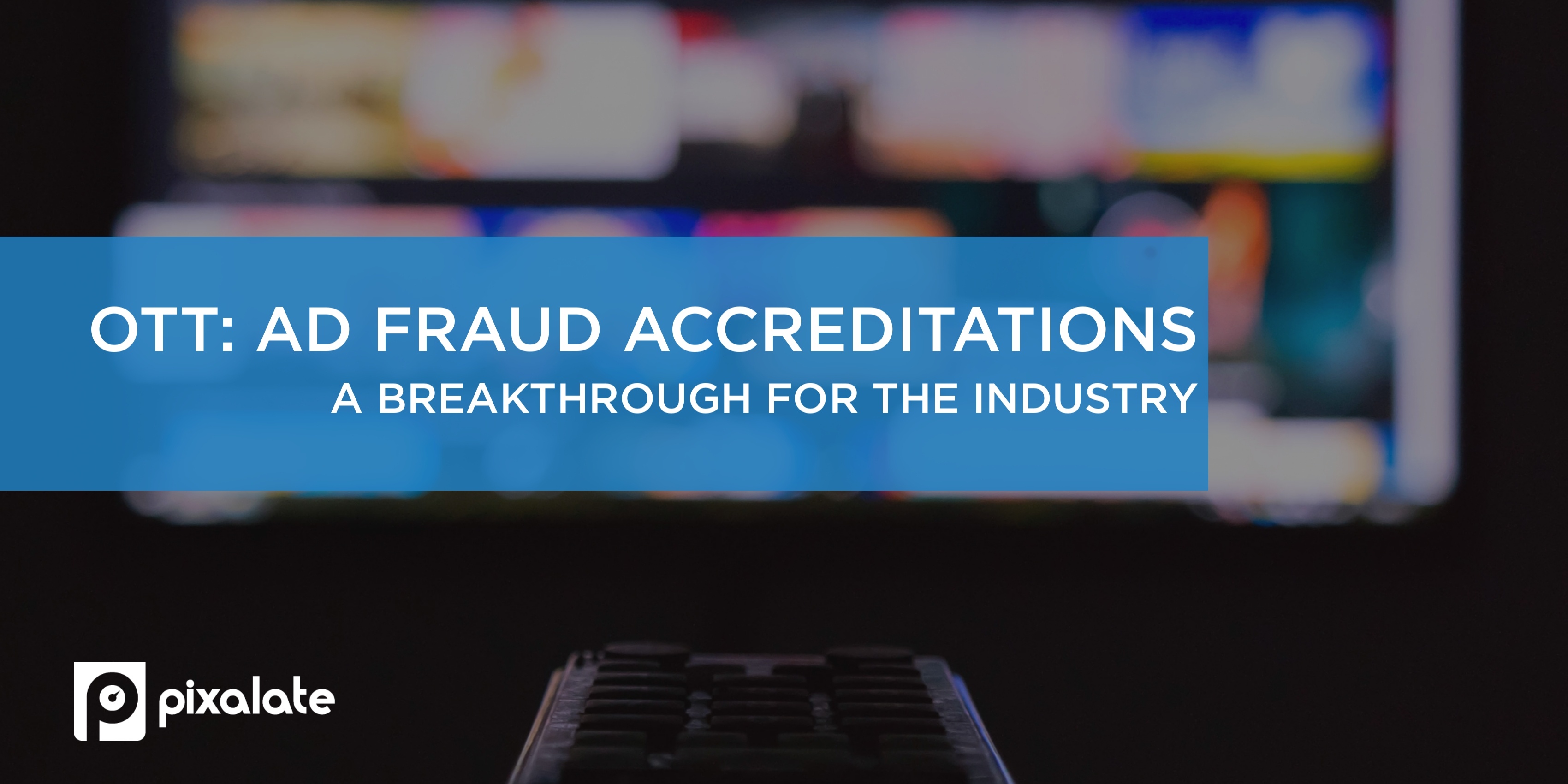
Pixalate this week became the first company to receive Media Rating Council (MRC) accreditation for Connected TV/OTT Sophisticated Invalid Traffic (SIVT) detection and filtration for video ad impressions. The company also received accreditation for its OTT served video ad impressions tracking.
This is a groundbreaking milestone for Pixalate and the OTT advertising ecosystem. In the upcoming weeks and months, Pixalate will bring you powerful intelligence about OTT fraud — what it is, how it occurs, and what you can do to prevent it. From server-side ad insertion (SSAI) challenges to the importance of IPv6 for OTT, we’re covering topics that come directly from your questions.
Follow and subscribe to our OTT data and news by visiting our Accreditation Hub, where you can find all relevant resources relating to our landmark MRC OTT accreditations. The Accreditation Hub also contains information about our other accredited anti-ad fraud solutions.
Pixalate monitors over 55 million Connected TV/OTT devices each month to detect and prevention invalid traffic, and our Q3 2018 data shows that global Connected TV/OTT ad fraud rates are 19%. That puts OTT advertising ad fraud rates on par with the problematic mobile in-app space.
Advertisers are projected to spend $50 billion in OTT by 2020, per Tru Optik, and without proper protection in place, fraudsters stand to steal billions as advertisers flock to this fast-growing channel.
Want to see how Pixalate can help protect your growing Connected TV/OTT ad budgets? Schedule a demo!
.jpg?width=300&name=eMarketer_Leading_Challenges_of_OTT_Connected_TV_Advertising_According_to_US_Agencies_and_Marketers_..._239906%20(1).jpg) With its latest MRC accreditations, Pixalate is now the industry’s first and only accredited solution for ad fraud detection and prevention in Connected TV/OTT.
With its latest MRC accreditations, Pixalate is now the industry’s first and only accredited solution for ad fraud detection and prevention in Connected TV/OTT.
According to a 2018 survey of U.S. agencies and marketers, inventory quality — i.e. verified and fraud-free inventory — is the No. 2 challenge in the Connected TV/OTT advertising space. That’s because, until now, nobody could measure (and therefore prevent) ad fraud in OTT.
Pixalate's industry-first accreditations are not just a big step forward for the company; it’s a landmark achievement for programmatic advertising. Buyers and sellers now have access to an accredited risk management solution to help them grow Connected TV/OTT investments while mitigating risk to brand reputation and ad spend.
“Pixalate’s OTT accreditations are a big step forward for the industry, as advertisers will be given a confidence boost in a highly desirable channel,” said Jay Friedman, President of Goodway Group. “Third-party validation is required for any new space to grow, and the OTT landscape is more primed than ever for rapid growth going into next year.”
In addition to our new MRC accreditation for SIVT detection and filtration of OTT video ad impressions, Pixalate also expanded its OTT products by adding high-risk OTT devices and IPs to our pre-bid Blocking solution. Pixalate’s Blocking works for IPv4 and IPv6 addresses and includes SSAI solutions.
Our expanded pre-bid Blocking solution, coupled with Pixalate's Analytics product, provides Pixalate customers with an end-to-end blocking and monitoring system to minimize risk and protect ad investments in the growing OTT ecosystem.
Schedule a demo to learn more about Pixalate’s Fraud Management System — the industry’s only anti-fraud platform with accredited OTT solutions.
*By entering your email address and clicking Subscribe, you are agreeing to our Terms of Use and Privacy Policy.
These Stories on Company News
*By entering your email address and clicking Subscribe, you are agreeing to our Terms of Use and Privacy Policy.

Disclaimer: The content of this page reflects Pixalate’s opinions with respect to the factors that Pixalate believes can be useful to the digital media industry. Any proprietary data shared is grounded in Pixalate’s proprietary technology and analytics, which Pixalate is continuously evaluating and updating. Any references to outside sources should not be construed as endorsements. Pixalate’s opinions are just that - opinion, not facts or guarantees.
Per the MRC, “'Fraud' is not intended to represent fraud as defined in various laws, statutes and ordinances or as conventionally used in U.S. Court or other legal proceedings, but rather a custom definition strictly for advertising measurement purposes. Also per the MRC, “‘Invalid Traffic’ is defined generally as traffic that does not meet certain ad serving quality or completeness criteria, or otherwise does not represent legitimate ad traffic that should be included in measurement counts. Among the reasons why ad traffic may be deemed invalid is it is a result of non-human traffic (spiders, bots, etc.), or activity designed to produce fraudulent traffic.”

